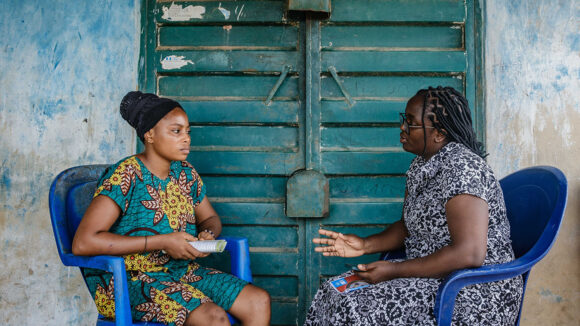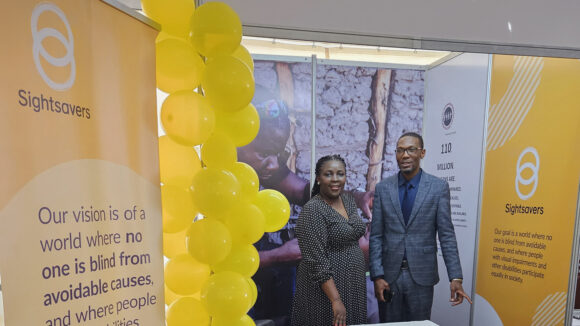NOTE: This article is more than five years old, but may still be relevant. For more recent content, see our news and blogs page.
Today is World Water Day – and you might be wondering why an organisation focused on blindness believes this to be such an important day.
But what you might not realise is that access to clean water, good sanitation and hygiene makes a big difference to the prevention of blindness.
So, today at Sightsavers we are marking this important day by highlighting the risk of blinding trachoma that women face due to poor access to water and sanitation.
For Sightsavers, water, sanitation and hygiene (WASH) is an important issue as it is very closely linked to the neglected tropical diseases (NTDs), two of which (trachoma and river blindness) are blinding. These diseases affect one billion of the world’s poorest people and we know that for ten of the diseases water and the availability of sanitation plays a role in their spread, for example through the risk of ingesting unclean water or not having enough water to follow basic hygiene practices.
Diseases of the poorest
NTDs are diseases of poverty. They afflict poor communities, living in overcrowded situations, with inadequate access to both water and sanitation but also to health services. Globally, less than one in three people have access to a toilet and throughout the world, the health and wellbeing of 780 million people is at risk each day because they don’t have access to clean water. This is why water and sanitation is so important to Sightsavers work on NTDs.
A burden on women
One of the NTDs, trachoma, is the leading cause of preventable blindness and a disease that affects women disproportionately. Due to their role within the household as mothers and caregivers, women are exposed to increased risk of trachoma and are three times more likely to develop blindness due to trachoma. In many countries, inadequate water, sanitation and hygiene access and the threat of trachoma are everyday realities of many women’s lives, locking them in a cycle of poverty. Inadequate WASH robs them of their time, their dignity, their health and education or livelihood opportunities to lift themselves and their families out of poverty. Women and girls are also charged with caring for family members who are sick or disabled by diseases such as trachoma due to inadequate WASH, placing an additional burden on them.
A SAFE way forward
While they bear the heaviest burden of trachoma and poor WASH, women are also often the group best able to raise awareness of and implement WASH and trachoma interventions due to their roles in the household. They can promote and support the delivery of both the preventive and treatment elements of trachoma control and elimination efforts that form part of the World Health Organization’s SAFE strategy. The strategy is comprised of four components that combine prevention and treatment efforts:
- Surgery: to stop eye lashes from rubbing against the cornea is performed to treat those at immediate risk of blindness.
- Antibiotics: distributed to all eligible members of the community to treat the trachoma infection and limit the spread of the disease.
- Facial cleanliness: to reduce the spread of trachoma.[i]
- Environmental improvements: proper sanitation for disposal of human waste is needed to reduce fly population and transmission.
Both the F and E components are heavily reliant on effective and accessible WASH services being present. Environmental changes to reduce fly numbers by promoting cleanliness throughout the community or improving latrine facilities may be costly or challenging to put in place, but universal access to safe water and community sanitation is critical to eliminating trachoma in the long term.
An end to trachoma
Millions of women endure trachoma because, according to the evidence, their gender-determined roles in their families and their communities expose them to increased risk. Yet, the elimination of blinding trachoma is possible by 2020- through the SAFE strategy. It is a challenging but achievable target; but only if control and elimination efforts integrate WASH and work to address the underlying conditions that allow trachoma to spread.
An inclusive approach
But women are not the only group at risk of blindness as a result of inadequate WASH – other marginalised groups, such as people with disabilities and older people also face this risk. This means that both NTD and WASH programmes need to work together to specifically target at-risk groups such as women and children but also marginalised groups such as people with disabilities or older people and make sure that not only do services reach them, but that they are involved in decision-making around WASH improvements and their voices are heard in the discussions.
There is a very strong link between trachoma, access to WASH and poverty. In order to address these issues, a holistic approach to development that tackles the underlying causes of poverty and ill-health is needed. Integrated approaches to WASH and trachoma are both more cost effective and crucially most likely to result in positive, long-lasting change. Improving WASH services will not only make a difference in the lives of women and girls it will also have a ripple effect across whole families and communities. Trachoma and WASH are women’s health issues but also women’s rights issues and addressing them through integrated efforts is central to the empowerment of women.
By Helen Hamilton, Policy Adviser at Sightsavers
[i] Ejere HOD, Alhassan MB, Rabiu M. Facewashing promotion for preventing active trachoma. Cochrane Database of Systematic Reviews 2004, Issue 3. Art. No.: CD003659. DOI: 10.1002/14651858.CD003659.pub2.
“Millions of women endure trachoma because their roles expose them to increased risk”
Want to read more about our work?
Neglected tropical diseases
Why community collaboration is important in our research
Our research on female genital schistosomiasis has highlighted the need to establish a safe and supportive environment for participants when studying sensitive topics.

The key to inclusive education is engaging organisations of people with disabilities
Collaborating with organisations of people with disabilities (OPDs) on our inclusive education projects has earned the Sightsavers-led Inclusive Futures consortium a Zero Project Award in 2024.

Six takeaways from the International Conference for Public Health in Africa
Sightsavers’ Hortance Manjo shares insights from the event in Zambia, which highlighted eye health for the first time.